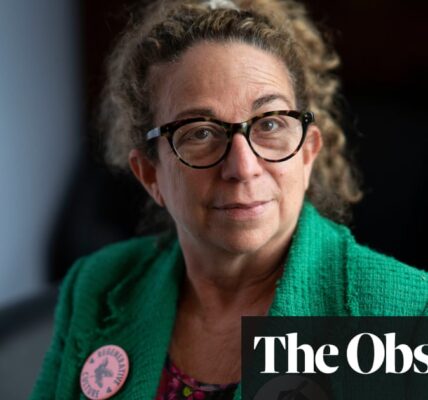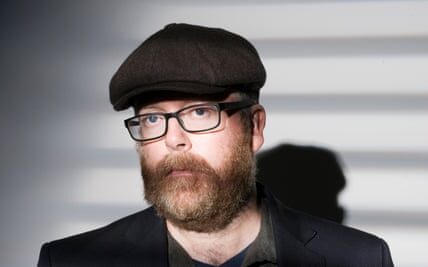‘At the start you get molested and by 45 you’re too old to work’ – the secret misery of women working in TV
‘When is the good time to be a woman in TV?” asks Michelle Reynolds, a former TV producer and director. “In the start you get molested and infantilised, in the middle if you have babies they won’t let you work flexibly, then when you get past 45 you’re too bloody old.”
Now is not the best time for women in TV. According to recent research by the Creative Diversity Network, whose Diamond report collects data from the UK’s big broadcasters, the gender gap is widening. The number of women in senior roles fell 5% between 2019 and 2022. One in three directors are women, yet they get only a quarter of director credits. Contributions from female writers fell from 43% to 32% between 2016 and 2022. Behind these figures, women are less likely to be employed on peak-time shows, which are generally more prestigious and have larger audiences, than men.
It is, say many women I have spoken to, a reflection of TV’s failure to address issues that have plagued the industry for years: sexist ideas about which jobs suit women (production manager but not director, makeup but not lighting), short-term contracts where career progression relies on who you know, a culture that demands long hours (people working in TV work two days more a week, on average, than the general population), plus sexual harassment and bullying.
Reynolds began as a runner – an entry-level job acting as a general assistant to the production staff – in 2001. She shifted focus to improving conditions for those working in TV. In 2018, she joined Share My Telly Job, an organisation set up by producer and director Louise Patel to help improve job-sharing and other forms of flexible working in the industry. Now, she runs ReelTime Media, training managers and advising freelancers in an effort to “make workplace culture fairer”. Her co-director there is Rowan Aust, a fellow TV escaper who worked as a production manager and researcher on shows including Newsnight Review and currently studies the industry at the University of Huddersfield. Aust’s work includes a study of gratitude – how the constant refrain that TV workers are lucky to be there entrenches bad conditions.
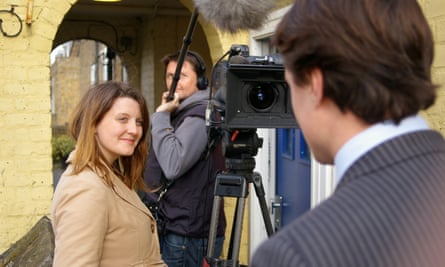
That pressure to count your blessings is stronger than ever. The UK’s TV industry is in crisis. Research by the broadcasting union Bectu and Sky News this year revealed 68% of respondents were out of work. It’s bad for everyone, says Reynolds, but “if you have any underlying inequalities, they’re going to be amplified by difficult working conditions”.
A post-Covid boom gave many the chance to secure the senior roles they’d long been qualified for. Now, as work becomes scarcer, those same women are forced to accept more junior contracts, for which they’re overqualified. Directors with years of experience describe being passed over, while comedy shows including Noel Fielding’s latest vehicle feature a single female writer in a team of six.
“With the lack of funding, there’s a risk-averse attitude,” says Emma Butt, who has worked in sound for more than a decade. “They only want to give work to what they deem a safe pair of hands. If you look at the industry 10 to 15 years ago, it was predominantly white men in senior roles. Now they’re looking back to those people. Women are again being overlooked.”
Industry gatekeepers are still reluctant to hire women, according to Doris Eikhof, a professor at the University of Glasgow who has extensively studied diversity and inclusion in the screen industries. “Women directors, for instance, are still perceived as a risky choice although the data shows that they are not commercially or artistically more risky than men directors,” she says.
Charlie Dinkin is a TV comedy writer and co-runs the production company Daddy’s SuperYacht: “Over the past few years, almost exclusively I’m hired by women. It’s got to be a bias that people are playing out.”

Those with hiring power used to claim they couldn’t find women with the right skills. In 2019, Victoria Emslie set up Primetime, a talent database for women and non-binary people working in behind-the-camera roles. By doing this she hoped “that excuse would no longer be valid”. And while the service is being used, and some network members feel gender is less of an issue than ever, others feel there’s still a long way to parity.
Lulu Elliott was working as a camera operator in TV and on music videos 15 years ago when she noticed a clear gender disparity in technical departments. Even now, lighting is 90% male, sound 87% and camera 84%. In 2009, she set up RA Agency to represent women in these roles. Things have improved, but “progression is too slow and one woman at a time”, she says. “It feels like productions are reluctant to take any risk.”
Butt knew post-production roles were dominated by white men. “I’m usually the only woman on a sound team. I’m mixed race and was usually the only person from a diverse background. But I was constantly told: we don’t have a diversity and inclusion issue.” In 2020, she conducted research with the Sir Lenny Henry Centre for Media Diversity. Looking at the top-rated UK-made TV shows, she found that of 55 sound professionals, 48 were white men.
These aren’t issues of ambition or interest, she says – when she gives talks to students at schools and universities, she sees women are well represented. However, in post-production there’s an increasing lack of entry-level roles, such as assistants and runners. Then, there’s little support to help people to progress. “Nepotism is rife. A lot of trying to get a job in this industry is done in the pub.” The right credits are vital, says Butt, but rely on someone giving you a chance.
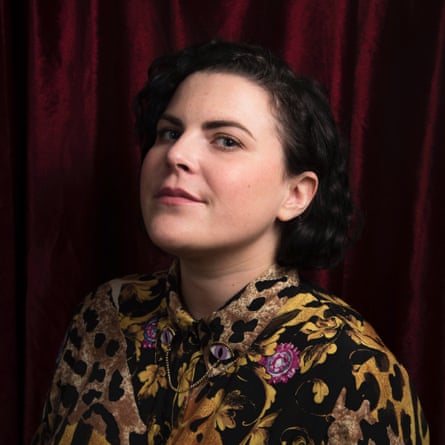
“It’s mid and senior level where we’re losing people,” Dinkin says. For writing at least, “entry level is well served by schemes such as the Women in Film and TV’s screenwriter’s lab, BBC Comedy Collective and Channel 4 new writers scheme. I joke that women always have to win a competition for their jobs.”
Eikhof’s research suggests relying on schemes can disadvantage women for this reason. “The onus is still too much on the people who are underrepresented to fix themselves,” she says, “rather than on those with the power to fix things structurally. We should instead be asking decision-makers: ‘Why does their decision-making disadvantage certain people?’”
Once you’re in the industry, the gender pay gap, according to 2021 data from the Time Project (run by the Share My Telly Job team and analysed by researchers at the University of York), is 17.6% for those on day rates. Women aged 20–29 face a gulf of 39%. This is wider than the national average – 14.3% for all employees, falling to 7.7% for full-time employees, and only 4.8% for those aged 22–29.
Women are also still more likely to be primary carers and find TV unwilling to accommodate this. “You give an awful lot of loyalty to TV, work really hard, miss holidays and friends’ weddings,” says Reynolds, who was made redundant from one job while on maternity leave. But that loyalty is never repaid: “They value availability over experience. They’d rather have someone less experienced who’s able to work 24 hours a day.”
This has forced many to leave. “There aren’t many senior women in TV who have children; those that do tend to have full-time nannies,” says Reynolds.
Flexible working is becoming more common, and job sharing can keep parents in the industry, but it’s not always welcomed. Leaving work on time to pick up kids, skipping drinks, “was frequently looked down upon”, says Aust. “I got ground down by it.” When Aust raised the possibility of flexible working with one director: “She thought I was joking.”
Reynolds tried part-time work, but “really, I worked for free on a Friday with a child screaming round my ankles”, she says.
“There’s tremendous cultural impetus,” Aust adds, “to get women to behave like men and not present any kind of disruption – don’t have a baby, don’t have IVF, don’t go through menopause, don’t have periods.” Reynolds knows an experienced documentary-maker who hides the existence of her son for fearing of losing work. Eikhof interviewed one woman who, when suffering from morning sickness on set, hid airline sick bags in her handbag so she could vomit discreetly.
Butt has experienced sexist bullying in numerous workplaces. She is regularly told how to do her job by men with less experience, and moved away from studio work after being routinely ignored by male directors and producers. In one recording session, when she tried to rectify technical errors made by a male engineer, he shouted at her in front of colleagues. No one in the studio defended her. “There’s only so many times you can come home from work in tears,” she says. “That sounds extreme, but it can break you down.”
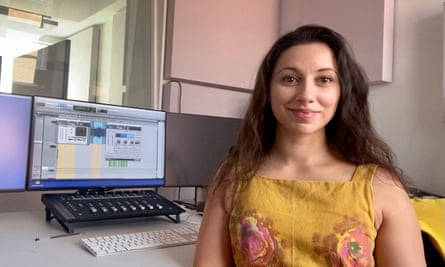
During her research, she also discovered women being sexualised by hiring managers – “being told they wouldn’t be hired in case they got into a relationship with men on the team”. The screen industries were the starting point of 2017’s #MeToo moment. But seven years on, change has been slow. In her 2023 research Safe to Speak Up?, Dr Anna Bull found “the UK film and television industry is still not fulfilling its legal obligations around preventing and responding to sexual harassment in the workplace”.
Interviewing 18 people who had experienced sexual harassment or violence in the UK TV industry, she found wider gender inequalities play a role: “The workplaces or settings where sexual harassment or violence took place were all described as being gender unequal.”
Aust recalls cultures created by older male talent in her career. “A presenter required young women of a certain look; the prettiest ones are sent to him to placate his tantrums,” she says. “For women, it’s the additional labour of understanding that everything you do is related to your body as opposed to your abilities.”
Reynolds agrees: “I was sent into certain situations and told: Michelle will be good at this because she looks like this.”
The 2023 Sunday Times/Dispatches investigation into Russell Brand, which included allegations (denied by him) from TV colleagues, demonstrates this culture, says Aust. “There’s still a perception in TV that your Russell Brands are exceptional, rather than viewing it as part of the spectrum many men are on. Television is still an industry dominated by older men and younger women.”
About 12% of TV workers experienced sexual misconduct, and one-third of those experiencing racial or sexual harassment considered leaving the industry, according to the Film and TV Charity’s 2022 Looking Glass report into industry mental health.
“Sexual harassment has been pushing women out of the industry for ever,” says Bull. “I don’t see any indication that that’s changed.” She has found that since #MeToo, people are encouraged to report harassment, but the TV industry still lacks ways to hold perpetrators to account and support victims, while many faced backlash after reporting. “In terms of industry initiatives, it’s really patchy,” says Bull. “In terms of culture changing, ways of working that have been sedimented across decades are unfortunately not going to change quickly.”
The Looking Glass report revealed two-thirds of women aged 25–59 had thought about leaving TV in the past year. “If you’re not having success or getting work, you start to think, ‘I’m rubbish,’” says Dinkin. “Then that starts getting in your way. We’ve all got to be critically engaging with and celebrating the work of women around us.” At Daddy’s SuperYacht, “part of our ethos is to fill in the skills gaps. Pick a woman who’s got it and champion the hell out of them, give them real work. Everyone has to do this.”
We can’t accept the gender gap, says Emslie, because “the stories we tell on camera are directly influenced by the makeup of the teams creating them”.
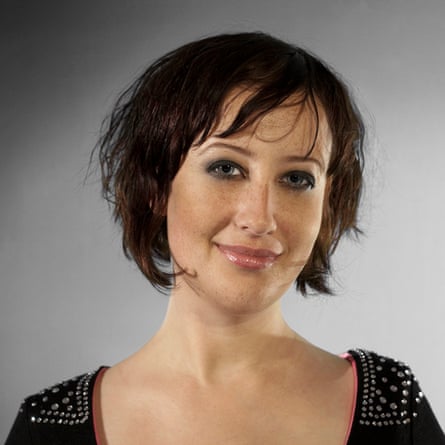
So who has the power to close the gap? “The decision-makers who have the money always have the power,” Eikhof says. “Focused interventions” such as funding childcare on productions would have an immediate impact.
“Broadcasters need to start putting pressure on production companies,” says Butt. She suggests setting diversity targets for post-production companies they work with. “If they don’t, we’re not going to have any women left.”
Aust agrees that change must come from the top. “There are very few people at very senior levels in TV, but I suspect that between Tim Davie, John McVay, Peter Bazalgette and a few other heads of channels and streamers, then yes, you could change things. But it’s where the will is.”
She has three suggestions: “Rate parity. Flexible working. Childcare.”
The industry also needs ways to flag issues anonymously, says Butt, as a culture of fear persists. When I was reporting this story, many women declined to speak to me on the record, afraid of losing work. “We are still in an industry that blacklists people,” says Butt. “Because I’m so outspoken, there are companies who don’t want to work with me. But how are we meant to change anything if no one’s willing to speak out?”
Do you have an opinion on the issues raised in this article? If you would like to submit a response of up to 300 words by email to be considered for publication in our letters section, please click here.
Source: theguardian.com
